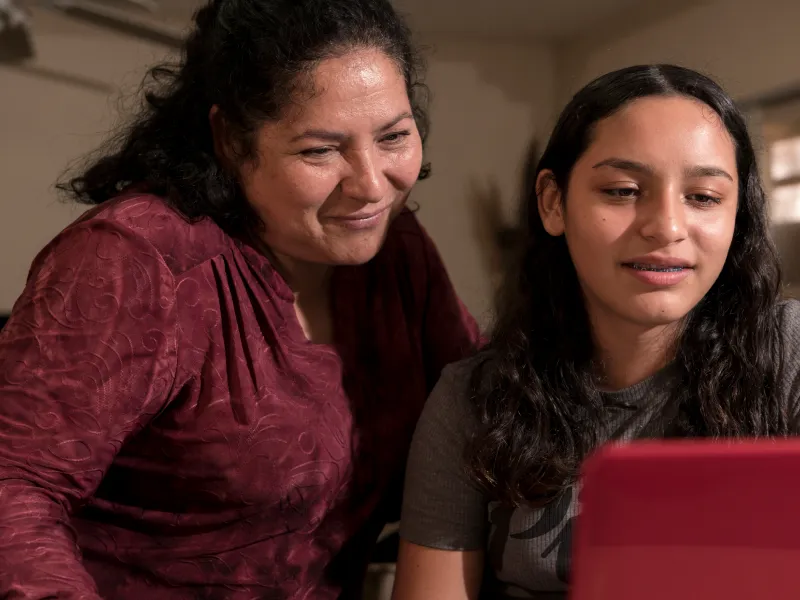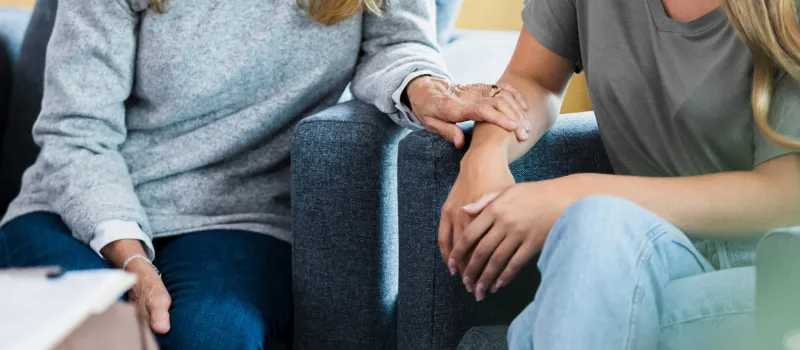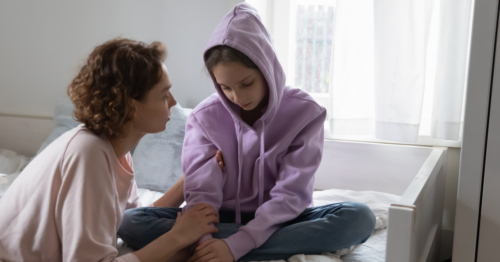
Table of Contents
Ask a Clinician: Common Myths About Family Therapy

Written By: Dr. Rasna Kaur Neelam
November 28, 2022
7 min.
Charlie Health’s Director of Family Programming, Kira Torre MS LMFT, answers the most common questions about family therapy and discusses how to better understand family therapy and its importance in your loved one’s treatment.
Learn more about our Clinical Review Process
Table of Contents
Our virtual IOP consists of three main types of support: personalized groups, individual therapy, and family therapy. Most people are very familiar with the ins-and-outs of individual and group therapy, but there are often misconceptions about family therapy that can deter families from participating. Given the importance of family therapy in the healing process, we talked with Charlie Health’s Chief Clinical Office, Dr. Caroline Fenkel, about family therapy at Charlie Health. She busts some of the most common myths about family therapy and explains why family therapy is so important for client success.
For those who don’t know anything about family therapy, how do you first introduce what it is to families?
Anytime a family comes to me for family therapy, we start by setting expectations to set the stage ahead of time. We let family members know that family therapy is not about blaming or shaming. We’re not here to point fingers. We just know there’s a problem, and we’re going to try and fix it together.
A lot of times, family therapy actually starts with one individual who is already in therapy. Over time, the family or therapist realizes it might be worth all meeting together. And for so many adolescent and youth mental health disorders–depression, anxiety, self-harm, suicidal ideation, technology addiction, behavioral issues–family therapy is really the recommended treatment alongside intensive groups, one-on-one therapy, and other supportive measures.
Who is designated “family” in family therapy? Who should be invited into family therapy?
This depends on the therapist and the family. Family therapy is designed for people who have relationships with each other that resemble a family structure.
This could be a family of two individuals who have kids together, a group of extended family members, adult children and their parents, or even grandparents and grandkids. Sometimes, family therapy can help more than just “traditional” family relationships. I’ll have roommates coming in who need help to constructively discuss and resolve conflict. I’ve even treated business partners.
But for our purposes here at Charlie Health, we focus on participants who collectively identify as a family. With our clients, this tends to be caregivers and parents, grandparents, foster parents, partners, and whoever else is present and supportive.
How long does family therapy last?
It depends on the family’s goals. A family coming together because they have serious conflicts and need to work on being able to have healthy disagreements might look different than a family coming together to make one specific decision. Family therapy may last for a couple of sessions over a month or two, or it could be a longer-term endeavor.
Join the Charlie Health Library
Get mental health updates, research, insights, and resources directly to your inbox.
You can unsubscribe anytime.
Let’s unpack some common myths about family therapy.
1. Family therapy is not useful if only one person “needs help.” Myth or fact?
Myth.
At its basic core, the family exists as a whole emotional unit. A lot of health issues, trauma, or unexpected changes really do impact the whole family in different ways. You can't remove anyone from that emotional unit or change anyone in that emotional unit without impacting the whole family.
Let’s say a teenager or young adult in the family is struggling and needs intensive treatment. Oftentimes, this also means the whole family is struggling. The parents are hurting or frustrated (or both) because they’re not sure what to do. Maybe your sibling is acting out and you're not sure why they just can't follow the rules.
The idea that if one person in a family is struggling means that the others are unaffected is a myth.
2. Family therapy is a way to punish a family member. Myth or fact?
Myth.
Sometimes people bring in their child or spouse and think that I’m going to fix them. The truth is, in family therapy, there's no “good guy” or “bad guy.” As a family therapist, I’m not there to be a judge and issue verdicts; I’m more like a referee who helps ensure there’s no foul play.
Instead of thinking punitively, I encourage families to come to therapy if they're uncomfortable with their communication styles or want to shift their family’s dynamic to be more loving and peaceful. My goal is to help them figure out how they can all feel well together; not punish one another or scorekeep.
3. If a family is not open and vulnerable at home, they will be too embarrassed to be open or vulnerable in family therapy. Myth or fact?
Myth.
For the most part, no therapist is going to start by saying “Hey, tell me all your secrets. Tell me all your resentments against your family member,” especially not in the first session. First, we have to establish trust. Being vulnerable in front of family members can be really, really hard. We have to work up to that together, and it’s my job to get us there.
For example: If you're a family that doesn't talk about feelings, we’re going to start with feelings vocabulary. We're going to start with thinking about, “What does it really mean to feel bad? What does it mean when mom or dad feel bad? What does it mean when a kid is mad? How does that impact you?” We build from there until the family can more easily and clearly share their feelings.
Do you need more support with
your mental health?
Charlie Health can help.
4. Family therapy requires families to already get along, otherwise they wouldn't agree to participate in family therapy. Myth or fact?
One part of this is true.
Like any therapy, you cannot convince someone to participate if they don’t want to. If they don’t want to be there, oftentimes they won’t gain anything meaningful from attending. There's a lot of people who don’t want to go to therapy or think they don’t need it, but end up in therapy and realize how much they like it or how beneficial it is.
To the second part: a family definitely does not have to get along to come to family therapy or to be successful with family therapy. In fact, I would think you probably have to not get along to come to therapy. This means that family therapy can sometimes be quite uncomfortable and tense, which is why it’s the therapist’s job to make sure everyone is safe, both emotionally and physically.
In our therapy sessions with families, you are allowed to say whatever you want, but we hold the rules. There's no being abusive. There's no yelling at one another. If the conflict is high, we're responsible for turning it down. If we can't talk about something, we'll remember to come back to it later. The most important thing is that everyone leaves feeling safe and feeling heard.

5. Coordinating multiple schedules to have a family join family therapy is too time consuming and not worth the effort. Myth or fact?
Myth.
Our team has created a very open, accessible family support programming schedule to help with this exact concern. Not every family member can show up to therapy right after work at 5 p.m. on the nose, every Wednesday (just one example). We have to work with that.
That being said, even if it is difficult logistically, family therapy needs to be a priority, especially for clients and their families enrolled in our virtual Intensive Outpatient Program. We have to make that commitment for the good of the family. It’s worth clearing the schedule once a week for the duration of treatment in order to reconnect with your family. It truly pays dividends if we can regularly have those really important conversations and connect with one another.
Everyone should be in family therapy every week. Maybe one week it's one parent and their teen; maybe another week it's a different caregiver; maybe there's a sibling issue that needs to be worked out over a few sessions. Not everybody has to be there all the time.
6. Family therapy only works for certain races or socioeconomic classes. Myth or fact?
Myth.
Everyone can benefit from family therapy regardless of their background. Everyone can benefit from taking time out of their day to focus on their family and their healing.
Research shows that a lot of evidence-based family treatments naturally lend themselves to cultural competence because of the fluid nature of the average session. Simply put: it’s the therapist’s job to make sure they are meeting you where you are and understand where you’re coming from.
“You’re the expert. You tell me what’s important to you. What are your family values?” And we go from there.
In conclusion, how does it work logistically for a family to get set up with family therapy through Charlie health?
Family therapy is a core component of our virtual IOP treatment plans for teens and young adults. It is vital that families participate in their loved one’s treatment–it shows their loved one that they care, they’re present, and they’re supportive of their healing journey.
Every family should attend our Family Orientation once their loved one is officially enrolled. From there, you should schedule your family therapy sessions as soon as possible. Family therapy is billed under the adolescent’s insurance and does not require additional insurance from each family member who participates.
Again, family therapy is the number one indicator for successful outcomes. One hour per week–that’s often all it takes to make a difference in the success of your loved one’s treatment trajectory.
Family therapy at Charlie Health
For more information about family therapy at Charlie Health, check out our family therapy and family support group pages. If you or your family needs support navigating serious mental health challenges, reach out today to get started and learn more about our treatment plans.





